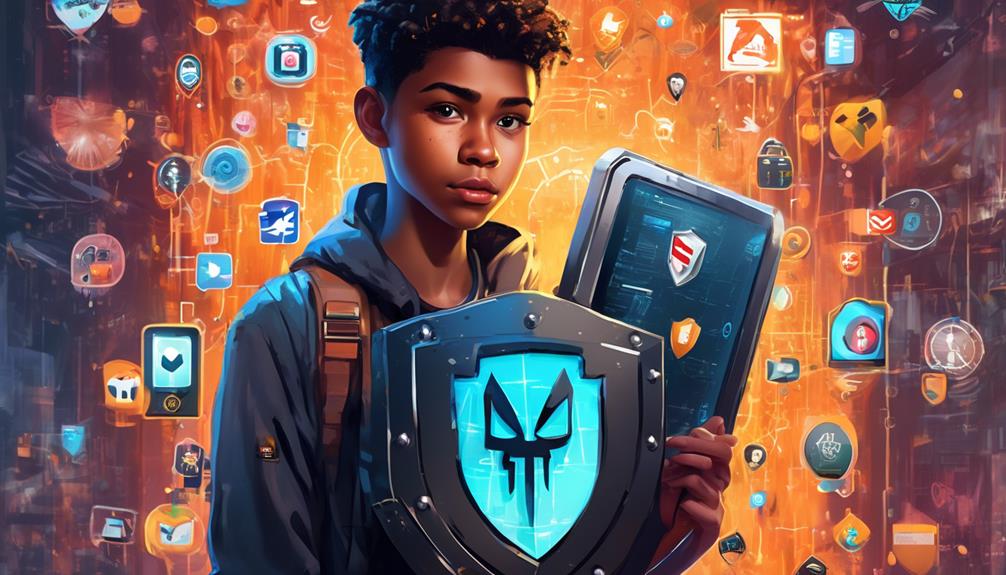When 17-year-old Emily shared her location on social media, it led to a risky encounter. Consequently, this highlights the urgent need for teens to learn digital citizenship. As they explore the digital world, understanding their online impact is crucial. They are not just users, but also creators in a realm filled with risks and chances.
Thus, protecting their data and identifying real versus fake content is essential. Digital literacy has become a necessary skill for survival. However, the challenge is to educate teens effectively without limiting their curiosity. Therefore, a balanced approach is key for their safety and the community's well-being.
Understanding Online Privacy

Understanding Online Privacy is essential for teens in the digital age. They must learn to protect their personal information. In the virtual world, knowing who's who is not enough. Furthermore, they should comprehend how their data is shared and used. Data sovereignty is a key element, signifying personal ownership of information.
As teens browse the web, cookie tracking monitors their online movements. These cookies are small data files, not actual sweets. They remember user preferences and activities, but privacy concerns arise. Many worry about the collection of personal information without clear consent.
Teens must get familiar with adjusting browser settings to control cookies. This ensures they only share information they're comfortable with. While they seek belonging online, privacy should not be compromised. The goal is to find a balance – to connect while maintaining digital autonomy.
Recognizing Cyber Threats
While teens take charge of their digital privacy, they must also stay vigilant against the myriad cyber threats that loom online. As they navigate the internet, building a community and finding their tribe, it's crucial they're armed with malware awareness. Malware, a software designed to harm, steal from, or disrupt computers, can masquerade as harmless downloads or even sneak in through flashy ads. Teens should know it's not just about avoiding the dodgy corners of the web; threats can pop up where they least expect them.
Phishing identification is another essential skill for teens to master. Cybercriminals often use deceptive emails or messages, pretending to be trustworthy entities, to lure individuals into giving away sensitive information. These phishing attempts can be sophisticated, seeming like they're part of the very communities teens are part of. But with a keen eye for suspicious links and an understanding of too-good-to-be-true offers, teens can sidestep these digital pitfalls.
Every click, share, and download is a decision, and making those decisions with a cybersecurity mindset keeps teens safe and their digital communities trustworthy. It's not just about personal protection; it's about preserving the integrity of the digital spaces they value.
Safe Social Networking Practices

Navigating social media safely is crucial for teens; it begins with mastering privacy settings. Importantly, they must learn to customize visibility of their posts and personal data. This ensures they avoid oversharing with the broader public. Additionally, maintaining respectful online interactions is vital. It safeguards their reputation and supports emotional well-being.
Privacy Settings Essentials
Understanding privacy settings is crucial for teens to safeguard their personal data on social networks. By mastering data control and implementing security measures, they enhance their online safety. It's about controlling who sees their shared content, aiding in avoiding unwanted attention and ensuring a positive digital footprint.
Encouraging teens to check and adjust their privacy settings regularly is vital. This habit prevents them from oversharing in the digital realm. It's akin to having a digital security guard, empowering them to choose who can access their personal world. With proper settings, they can protect their secrets and feel secure within their online communities.
Respectful Online Interactions
Teens must embrace respectful online interactions, cultivating a safe, positive social network environment. Importantly, they should grasp the significant impact of their words on others. By engaging in healthy debates and providing constructive criticism, they can foster learning and growth. Nonetheless, empathy and consideration for others' feelings are essential.
To contribute to a nurturing online community, teens ought to practice kindness. They should think critically before posting or commenting. Avoiding harm is vital; yet, actively creating an inclusive space is equally important. In doing so, they will shape a digital realm that is both informative and supportive.
Identifying Scams and Fraud
Navigating the digital world, teens must recognize scam and fraud targeting. Importantly, they should learn to identify deceptive online offers. These often promise excessive rewards with minimal effort required. Furthermore, it's crucial for them to protect their personal information. After all, this information is what scammers use to access various digital avenues.
Spotting Deceptive Online Offers
In the digital era, young individuals need to stay alert for deceptive online offers. These offers often appear as irresistible opportunities. Critical thinking and consumer knowledge are essential. They help in identifying scams.
It's common to feel others are getting incredible deals or earning easy money. However, if an offer seems flawless, it's likely not genuine. Being skeptical is wise.
One should be aware of several warning signs. These include pressure to act quickly and requests for personal information early on. Also, look out for spelling mistakes in supposed professional messages.
Always question and do your research. The goal isn't to miss opportunities; it's to remain secure and informed. We are part of a community that values smart online practices and sharing verified deals.
Protecting Personal Information
Being skeptical of too-good-to-be-true offers is vital. It's equally crucial to protect personal information to avoid scams and fraud. Data literacy is more than a buzzword. For teens in the digital world, it serves as a shield. Knowledge about secure passwords and privacy settings makes them less vulnerable. They become more empowered, not through fear, but through smart, informed online interactions. Teens should create complex, unique passwords for their accounts. This is a practical step to strengthen their digital presence. Regularly updating passwords is a good practice. Additionally, using multi-factor authentication where available is recommended. It gives teens a sense of control. Moreover, it fosters a feeling of belonging in their online communities. They can engage safely and securely.
Protecting Personal Information

Teens must vigilantly protect their personal information online. This is essential to avoid identity theft and privacy breaches. In our digital world, data literacy is not just beneficial; it's essential for safety. Teens equipped with this knowledge can navigate the web confidently.
Secure passwords are a primary defense against privacy invasion. These passwords act as secret codes to their private online spaces. By using them, teens keep intruders at bay. It's vital for teens to create strong, unique passwords for every account. This practice is akin to having individual keys for distinct locks, enhancing security.
Moreover, teens should exercise caution on social media. It's crucial not just to monitor posts but also to control app permissions. They should always question the necessity of app requests, like access to location or contacts.
Ethical Online Behavior
Beyond safeguarding personal information, responsible digital citizens also practice ethical behavior in their online interactions. They know each post, comment, and like adds to their digital footprint, a lasting mark of their presence online. Teens should understand that what they share can define them now and in the future, so responsible sharing isn't just smart; it's essential.
Responsible digital behavior means thinking twice before posting or sharing content. It's about asking oneself if something could harm or offend others, and if it does, choosing to keep it to oneself. This shows respect for the diverse community that exists online, where everyone's looking to fit in and feel accepted.
Teens can set the standard for ethical online behavior by leading with empathy. When they encounter cyberbullying or unfair treatment, they can be the ones to step up, report it, and offer support to those affected. This not only helps build a safer digital world but also fosters a sense of belonging where everyone knows they've got each other's backs.
Ultimately, teens learning digital citizenship isn't just about protecting themselves; it's about contributing to a respectful and inclusive online community where everyone can thrive.
Navigating Digital Relationships

In the digital age, fostering healthy online relationships is crucial. They require clear communication, mutual respect, and boundaries. Teens must handle digital complexities with grace. They are not simply chatting; they're creating a valued community.
Mastering digital etiquette is essential. It involves knowing when to share and when to pause. Remember, there's a person with feelings behind every screen. Online empathy allows teens to respect others' emotions. This creates a safe and supportive environment.
When teens embrace these principles, their digital connections thrive. They learn to express themselves and listen. They handle misunderstandings with sensitivity. They also know when to step back or help someone in need. These skills, once learned, benefit them in all life areas, preparing them for an interconnected world.
Reporting and Responding to Cyberbullying
Understanding how to confront and report cyberbullying empowers young people. They learn to protect themselves and others online. It's not solely about safety; it also promotes a community of support and belonging. By arming themselves with the correct tools, teens don't just defend themselves. They also become role models for their peers.
Here's how they can effectively tackle cyberbullying:
Firstly, be vigilant and recognize the signs of cyberbullying. It can be subtle, but acknowledging it is crucial. Secondly, don't just watch if you witness cyberbullying. Take action, which could include supporting the victim or reporting the behavior. Thirdly, it's essential to report cyberbullying correctly on various platforms. Social media sites usually provide reporting tools for this purpose. Finally, learning and practicing empathy is vital. It involves understanding the feelings and experiences of others. Empathy training aids teens in responding with compassion and choosing the best action.
Frequently Asked Questions
How Can Learning Digital Citizenship Influence a Teen's Future Career Prospects?
Acquiring digital citizenship skills is essential for teens. It enables them to manage their online presence effectively. Moreover, mastering networking online is crucial for career opportunities. Additionally, it facilitates professional growth. Ultimately, it's pivotal for a future where teens are both valued and well-connected.
What Role Do Parents and Educators Play in Teaching Digital Citizenship to Teenagers?
Parents and educators are crucial, offering guidance and tools to promote responsible internet use. Additionally, they shape teens' digital manners, essential for their integration into our connected society.
How Does Digital Citizenship Vary Across Different Cultures and Countries?
Cultural sensitivity and legal differences influence digital citizenship worldwide. Consequently, recognizing these subtleties promotes inclusion. This approach helps people respect diverse norms in digital environments.
Can Digital Citizenship Principles Be Applied to Emerging Technologies Like Virtual Reality and the Metaverse?
Consequently, she maintains that digital citizenship principles can steer virtual ethics. They promote responsible avatars in VR and the metaverse. This approach ensures a respectful, inclusive online community, helping all participants feel integrated.
What Are the Psychological Impacts of Not Adhering to Digital Citizenship Norms for Teenagers?
Teens who disregard digital citizenship norms could face a significantly increased risk, up to 70%, of cyberbullying. Consequently, this can affect their mental well-being. They require guidance to ensure safe online navigation. Additionally, this helps to cultivate a community feeling.
Conclusion
In the digital age, teens need to navigate online spaces safely and responsibly. With digital citizenship skills, they can protect their data effectively. Additionally, they learn to discern credible information. For instance, Emma recognized the red flags of a phishing scam. Consequently, she thwarted potential fraud.
Moreover, teens foster ethical online behavior. They also develop resilience against cyberbullying. Therefore, they're not only safeguarding themselves. They're also contributing to a healthier digital community. Hence, it's not merely about personal safety. It's about being a conscientious inhabitant of the digital world.



